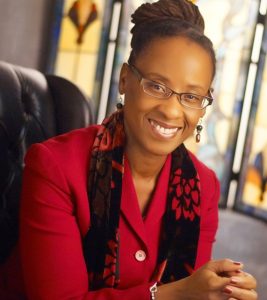A married gay clergyman from California was among 13 new bishops elected by United Methodist delegates to five regional U.S. conferences Nov. 2-5. And that was only one of several first-ever results of this year’s elections.
The election of Cedrick Bridgeforth marks the second time The United Methodist Church’s Western Jurisdiction has elected an LGBTQ clergyperson despite the denomination’s ban on gay ministers.
The 12-state jurisdiction that includes Guam and Saipan elected married lesbian clergywoman Karen Oliveto in 2016. Her election set off a firestorm of controversy that resulted in a church trial over her consecration and a special 2019 General Conference at which traditionalists narrowly voted in greater penalties against ordaining LGBTQ clergy and performing same-sex marriages.
Echoes from 2019 rang out again in the 2022 bishops’ elections. Centrist and progressive delegates chosen in 2019 by nearly 75% of U.S. regional conferences comprised the 2022 jurisdictional assemblies.
Delegates elected a 2022 class of bishops that is the most diverse group in both race and gender of any elections since the denomination was founded in 1968.
The first bishops’ elections showed clearly that delegates were determined to defy traditionalists’ exclusionary vision for the UMC. Unable to repeal the tightened bans because of three pandemic-caused postponements of the worldwide legislative assembly, defiant delegates used bishops’ elections to signal their intentions for the UMC’s future.
That future appears unlikely to include many of the traditionalists who voted in tighter LGBTQ restrictions. In more fallout from General Conference pandemic delays, the primary dissident organization, the Wesleyan Covenant Association, launched a new traditionalist denomination, the Global Methodist Church, in May. Since then, hundreds of traditionalist congregations have entered the “disaffiliation” process enacted by the 2019 General Conference — an exit process that ironically traditionalists approved expecting pro-LGBTQ congregations would use it to leave the UMC. Yet the departing traditionalist congregations so far comprise less than 10% of the 30,000 United Methodist churches in the United States.
This year’s delegates elected a 2022 class of bishops that is the most diverse group in both race and gender of any elections since the denomination was founded in 1968. Seven of the 13 new bishops are clergywomen.
North Central Jurisdiction
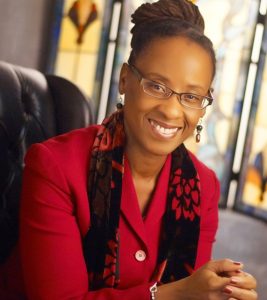
Kennetha Bigham-Tsai
Kennetha Bigham-Tsai, a Black clergywoman and leader of pro-unity and centrist forces, was elected on the first ballot and was the first elected of all jurisdictions. Bigham-Tsai served as executive of the ministry-coordinating body, the Connectional Table, which has repeatedly proposed reorganizing the UMC’s global structure to permit more regional autonomy, thus opening a way for the possible U.S. repeal of anti-LGBTQ rules.
Lanette Plambeck, a white clergywoman and bishops’ assistant from Iowa with extensive experience leading evangelism and clergy excellence efforts, was elected second.
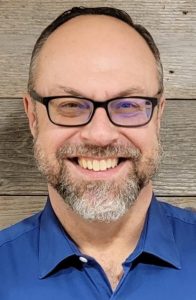
Dan Schwerin
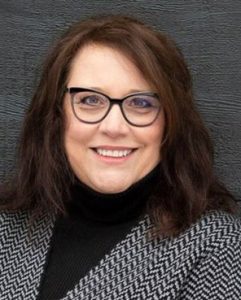
Lanette Plambeck
Dan Schwerin, a white clergyman from Wisconsin, was elected as the third bishop allotted for this year. Schwerin has 35 years’ experience leading churches of every kind: urban and rural churches, a new church plant, and a multi-staff downtown setting that became an LGBTQ-affirming congregation.
The North Central Jurisdiction covers Illinois, Indiana, Iowa, Michigan, Minnesota, North Dakota, Ohio, South Dakota and Wisconsin.
Northeastern Jurisdiction
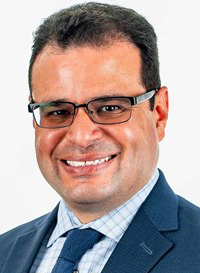
Héctor A. Burgos
Delegates elected Héctor A. Burgos, a New Jersey clergyman, as the first Hispanic bishop in the region. After an electoral impasse emerged between a clergywoman from the strongly traditionalist Western Pennsylvania Conference and a dynamic, openly gay clergyman from the New England Conference, delegates voted to postpone election of a second bishop until 2024.
The Northeastern Jurisdiction covers Connecticut, Delaware, Maine, Maryland, Massachusetts, New Hampshire, New Jersey, New York, Pennsylvania, Rhode Island, Vermont and West Virginia and the District of Columbia.
South Central Jurisdiction
Delegates demolished South Central’s racist, sexist history by electing all three of their allotted bishops on the first ballot.
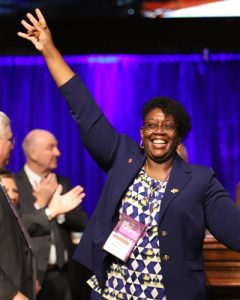
Dee Williamston
Dee Williamston, a Black clergywoman and bishop’s assistant from Kansas, became the first African American female bishop in the region. She was elected with the most votes of the top candidates.
Laura Merrill, a white clergywoman from Texas who is fluent in Spanish, has missionary experience in Chile and with migrant ministries along the U.S.-Mexico border. She was instrumental in guiding the merger of the former Southwest Texas Conference with the Spanish-speaking Rio Grande Conference to form today’s Rio Texas Conference.
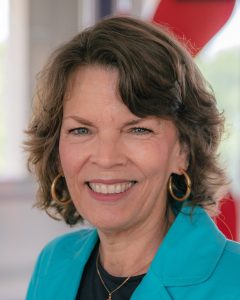
Laura Merrill
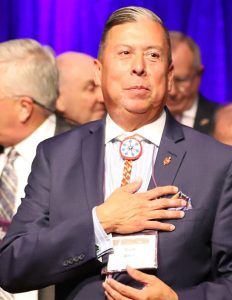
David Wilson
David Wilson, an Oklahoma clergyman, is the first Native American bishop in the UMC’s history. Wilson labored in supervisory positions in the Oklahoma Indian Missionary Conference — another vestige of the UMC’s racist past — for nearly two decades before gaining more church-wide prominence aiding the Standing Rock Sioux tribe in its fight against a major oil pipeline through its South Dakota reservation.
The South Central Jurisdiction covers Arkansas, Kansas, Louisiana, Missouri, Nebraska, New Mexico, Oklahoma and Texas.
Southeastern Jurisdiction
The specter of more than four centuries of racist culture continued to hang over Southeastern proceedings. Allegations of racial bias in candidate selection led the jurisdiction’s College of Bishops to pledge creating a special committee to review the process.
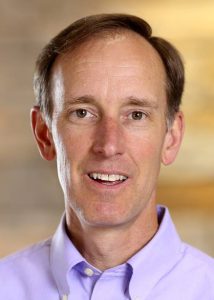
Tom Berlin
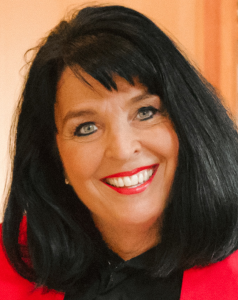
Connie Shelton
Tom Berlin, a white large-church pastor from Virginia who has been an articulate leader of centrist forces, was elected first. Berlin helped craft a plan intended to give annual conferences and congregations “local option” on accepting LGBTQ clergy and performing same-sex marriages, the proposal traditionalists defeated in 2019.
Connie Shelton, a white Mississippi clergywoman endorsed by the jurisdiction’s clergywomen’s caucus, has experience with both urban and rural churches. A communications expert, Shelton directed the Southeastern Jurisdiction’s radio and TV ministry, “The United Methodist Hour.”
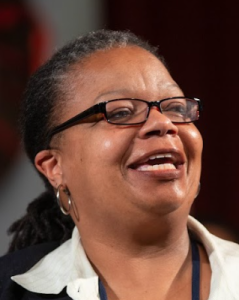
Robin Dease
Robin Dease, a Black clergywoman from South Carolina, was a write-in candidate on the first ballot. Her pre-election role as senior pastor at St. Andrew By-The-Sea in upscale Hilton Head, S.C., made her the first African American female lead pastor of a historically white UMC congregation in South Carolina.
The Southeastern Jurisdiction covers Alabama, Florida, Georgia, Kentucky, Mississippi, North Carolina, South Carolina, Tennessee and Virginia.
Western Jurisdiction
Ever faithful to its barrier-breaking tradition, delegates used an alternative method of selecting candidates to broaden the racial-ethnic and gender mix. The process resulted in an initial field of 33 clergypersons, most of whom put themselves forward as episcopal possibilities. Even so, some Western delegates alleged that racism still dogged bishops’ elections, with multiple floor motions pledging even greater inclusion in future.
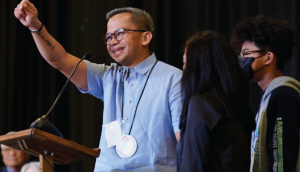
Carlo-A.-Rapanut
Carlo A. Rapanut, a Filipino-American clergyman from Washington State, became the first bishop of Filipino heritage elected in a U.S. jurisdiction. (The UMC also has a conference in the Philippines itself). His candidacy held such significance that some of his far-flung family traveled from Australia to be present in Salt Lake City, where the conference was held.
Cedrick Bridgeforth, a Black, openly gay, married clergyman from Los Angeles, has emphasized leadership excellence and education in his ministry. He previously served as pastor in LGBTQ-friendly churches in Southern California.
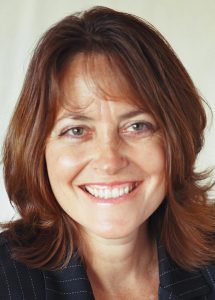
Dottie Escobedo-Frank
Dottie Escobedo-Frank, a former social worker turned clergywoman from Arizona, became the jurisdiction’s third Hispanic bishop. A prolific author, she has experience in missions with migrants and will join Rapanut in supervising immigration ministries along the U.S.-Mexico border.
The Western Jurisdiction covers Alaska, Arizona, California, Colorado, Hawaii, Idaho, Montana, Nevada, Oregon, Utah, Washington and Wyoming, along with the U.S. territories of Guam and Saipan.
Non-U.S. Conferences
In addition to its U.S. jurisdictions, the UMC has seven regions it terms “central conferences,” a designation that has fallen into disrepute because of its links to the former racially segregated Central Jurisdiction in the United States. The Central Jurisdiction, to which all Black pastors and churches were assigned, was formed in 1939 in the merger of three branches to create The Methodist Church. General Conference delegates abolished it in 1968 in creating the current UMC.
The move toward greater international regionalization also proposes to make the U.S. church a separate region. The overall intention, say proponents, is to give each region greater autonomy in its cultural context and to reduce the denomination’s U.S.-centric political focus. Traditionalists have said they see regionalization as only a mechanism for pro-LGBTQ forces to do away with the church’s bans on LGBTQ clergy and same-sex marriages.
Current non-U.S. regions are Africa, Central and Southern Europe, Congo, Germany, Northern Europe, Philippines and West Africa. According to UM News, Central and Southern Europe delegates will meet Nov. 16-20 to elect bishops. Philippines delegates will gather Nov. 24-26 for their episcopal elections. Bishops in the three African central conferences have said their areas will postpone their episcopal elections until after the next General Conference.
Organizers announced last week that the thrice-postponed legislative assembly will be held April 23-May 4, 2024, in Charlotte, N.C.
All bishops elected this year will take office Jan. 1, 2023. The schedule is different from decades past because of pandemic postponements.
Cynthia B. Astle is a veteran journalist who has covered the worldwide United Methodist Church at all levels for more than 30 years. She serves as editor of United Methodist Insight, an online journal she founded in 2011.
Related articles:
In stunning development, United Methodist African bishops repudiate separatist group
Foundry Network offers third alternative to disaffected UMC churches
Events turn against disaffected forces wanting to leave the UMC

